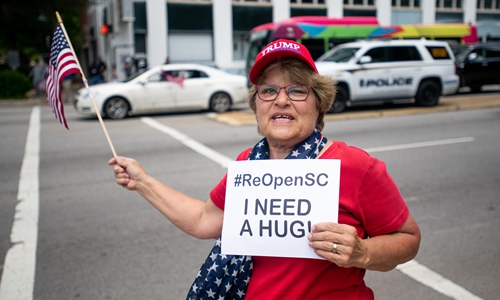US 'the beacon of hope' has lost its way, headed toward self-destruction
By William Jones Source:Global Times Published: 2020/5/16 13:53:40
US "beacon of hope" lost its way

A woman protests against government closures of non-essential businesses due to the coronavirus in Columbia, South Carolina, the US on April 24. Photo: AFP
Many international observers have been shocked when they look at the US and see, in the midst of the greatest pandemic since last century, dumbfounding acts: university students romping on the beaches, demonstrators at state capitols without masks demanding an end to quarantine measures, and fake social media campaigns warning about the dangers of being vaccinated. Is this a society gone mad and plunging toward its own destruction?
The US, historically characterized as a "temple of liberty" and "beacon of hope" for much of the world, seems to have lost its way. Rantings and ravings about China from an unhinged "Bully Pulpit" seem to characterize a political elite that has grown totally hysterical over its envisioned loss of influence.
The US has begun its crucial primary season leaning toward the main election this November. The country had gone through a long period in which the tradition of war-time mobilization (similar to what Franklin Roosevelt did during World War II) was long forgotten. Since then, the US has shifted toward "laissez-faire" policies and a cultural fear of "big government." These values have become deeply engrained in American society.
When the coronavirus started making its way from state to state in America, there was a great deal of disbelief.
Keeping the crisis "in house" might have prevented it from becoming more grist to the mill for the anti-Trump Democrats. Even his measures were based on the best possible scenario fantasies - beyond even the scope of too little, too late comments.
As the virus turned the state of New York into a new epicenter of the disease, Trump's tone was dismissive of the disease's lethality.
Although the White House seemed to take control, the president was content to leave the "heavy lifting" up to the states, but promised that the federal government would "back up" if necessary. But the states were overburdened with the epidemic and were low on medical equipment and hospital beds.
While China had provided a prime example of how a country dealt with this threat, there was also a clear aversion in the White House to "do like China did." On the contrary, there was even a tendency to do the opposite of what China did, and at great cost. Wearing face masks was discouraged, indeed, as the president prided himself on not wearing a face mask. There were also not enough masks available and the government would have to take the initiative to getting them produced.
Such a threat as the coronavirus really required an FDR-like response. While much of Roosevelt's progressive legislation has been laid to rest by decades of "free-market" Republicans (and Democrats), Trump did have the Defense Production Act (DPA) at his disposal. If invoked and implemented it would have allowed him to mandate private industry to produce whatever they had the capability to do to in order to produce face masks, ventilators, or nucleic acid tests.
And while Trump did invoke the DPA, he didn't implement it, relying instead on the "goodwill" of industry to do his bidding.
But he did not dare open himself to attack. Because being too much in favor of "big government" would endanger his re-election chances.
Similarly, with his "passing the buck" to the individual states, he hoped that any new "surges" might be attributed to the state governors - and not to the White House.
But as the death toll rises nationwide, it will be hard for the Trump administration to shift blame. The fuss that's being made by Secretary of State Mike Pompeo and others about "making China pay" for the costs of the virus is simply a transparent and cheap maneuver to place blame somewhere else other than the White House.
But with the lack of clarity coming from the Oval Office, why won't everybody take the coronavirus seriously - until, of course, it arrives in one's own neighborhood? The epidemic, the anti-big government stirrings within the Republican Party, the breakdown of bipartisanship from the never-Trump Democrats, and the fixation of the president on his fluctuating poll numbers, have meant that the trumpet call to battle from the White House has never sounded a clear note.
In addition, many of those "rugged individualist" types of which America is filled with and whom also belong to many different cult-like groups spouting "independence" from most social forms of life, have added to a very dangerous mix.
They have unfortunately felt that they had a new lease on life with the election of a president like Trump - who wasn't an "establishment figure." His election in 2016 emboldened them to be "pro-active." No wonder these university students out on the beaches amid this plague think that they are doing no harm given that, opinion, even at the highest levels, is so divided. Combined with what always seems to be the general sense of the young, namely that they are "invincible," this situation is creating a serious liability for the US to overcome the virus fight.
The author is the Washington Bureau Chief of Executive Intelligence Review and a non-resident fellow of the Chongyang Institute for Financial Studies. opinion@globaltimes.com.cn
Newspaper headline: US "beacon of hope" lost its way
Posted in: VIEWPOINT